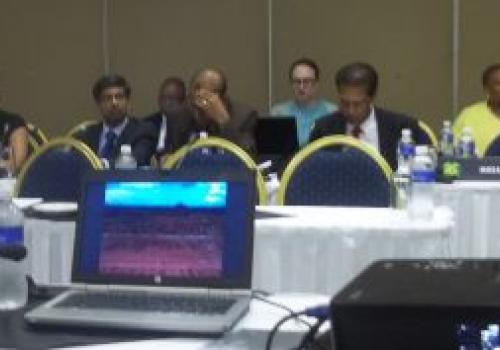Climate change remains one of the major cross border challenges facing the SADC region today. Its impacts continue to be felt in all the sectors of the regions’ economy. It has the potential to derail and undermine the hard earned progress the region has made over the past few decades.
Considering that climate change is a regional challenge that needs to be tackled at the regional level, the SADC Secretariat convened a regional consultative workshop which too place in Gaborone Botswana from 25th – 26th March 2014 and brought together 58 participants from eleven SADC Member States. The objective of the workshop was to agree on strategic interventions for a comprehensive Regional Climate Change Strategy and Action Plan for the Region. Specifically the workshop was intended to enable Member States to agree on strategic areas of climate change intervention for the Regional Strategy and Action Plan, share lessons learnt and best practices across the region and around the world on climate change, discuss availability of data and information and modalities for sharing of information and communication across Member States, and identify and define institutional frameworks and financing mechanisms for the implementation of the strategy.
In his opening remarks the Chair, Assistant Director in the Ministry of Environment and Climate Change, Malawi, Mr Michael Makonombera, noted that climate change is real and that it is one of the biggest challenges facing mankind in the region and the world at large today. He noted that the impacts were evident and included rising temperatures, rising sea levels, erosion of coastal zones, frequent droughts and flooding, erratic rains just to mention a few.
“Therefore, the risks for our countries and for the future generations are colossal; hence we need to take urgent action now. It is against this background that we applaud the efforts by the SADC secretariat in leading the way and bringing us together as members of one family with common destiny and with common aspirations so that we come up with solutions that suit all of us“, Mr Makonombera said.
Speaking at the same function, Acting Deputy Permanent Secretary in the Botswana Ministry of Environment, Wildlife and Tourism, Mr Jimmy Opelo, said since climate change affects most sectors of the economy and threatens to derail developmental aspirations, efforts to address the phenomenon require policy intervention.
Mr Opelo pointed out that it was gratifying to have SADC region host the workshop at a time when the government of Botswana was developing a national climate change policy, strategy and an Action plan.
Speaking on behalf of the SADC Secretariat, the Director Food, Agriculture and Natural Resources (FANR), Mrs Margaret Nyirenda, noted that issues concerning the environment were of prime importance because the environment provides ecosystem goods and services that directly support critical sectors such as Agriculture, Water, Energy and Tourism all of which contribute to the region’s GDP.
Mrs. Nyirenda pointed out that the region is experiencing unprecedented environmental degradation resulting in various problems including climate change. This has affected all the sectors including Agriculture which contributes 17% to the region’s GDP.
“In response to this, SADC has initiated a number of projects and programmes both at regional and national levels aimed at reducing the impacts of climate change. One such effort is the development of the Regional Climate Change programme that was approved by Ministers responsible for Environment and Natural Resources in October 2013.”

